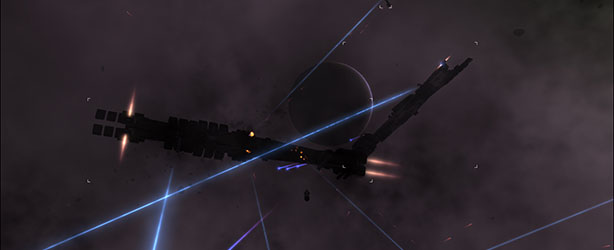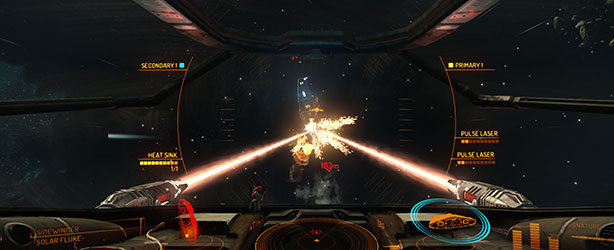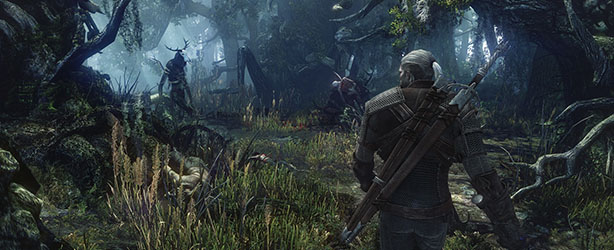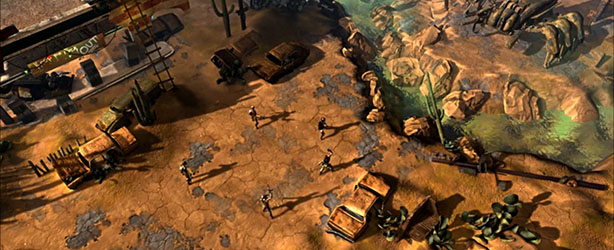The Five Gaming Trends of 2014
2013 was a fascinating year in gaming, but in some ways it felt like merely a warm up for 2014. 2013 saw the release of two major new consoles, but no particularly outstanding games for them. Meanwhile, the Kickstarter craze that began in 2012 has been in full swing for the last twelve months, but mostly it was about games being made rather than released. 2013 was about new hardware and new ideas. 2014 is all about games.Originally we planned to bring you some kind of list of the ten most exciting games of next year. But that was A) severely limiting, and B) extremely boring, so instead we've traced together five major themes that will dominate the next twelve months of gaming, and combined them here for your ocular pleasure.
The Year We Return to Space
If anything is going to mark out 2014 over and above other years in gaming, it's that it sees the return of the space-sim, which has been lost in the inky vastness for over a decade. In that time there has only really been one space game to capture the imaginations of gamers and that is EVE Online. The X Series has proved an occasional distraction, and Albion Prelude is a quality title, but more recently the series has been somewhat soured by the utterly dreadful X-Rebirth.

Limit Theory
In 2014 all that will change (well, not X-Rebirth, unless Egosoft rebuild the game from the ground up). To begin with, there are two enormous projects in development courtesy of the biggest names in space-gaming history; Frontier Development's Elite Dangerous, headed by David Braben, and Chris Roberts' Star Citizen.
Watching these projects come together over the last year has been fascinating. Initially it was Star Citizen that grabbed the headlines. Currently it's the most successful crowd-funded game ever, earning over £30 million in Kickstarter backing and other investments. Roberts plans for the game to ship with both a Wing Commander esque single-player campaign named Squadron 42, while Star Citizen itself is a persistent online world shared by virtual spacefarers. Elite Dangerous had a rockier start with a Kickstarter that initially appeared to trade on Elite's legacy and little else, but recently Frontier released a space-combat Alpha featuring eight showcase missions of varying difficulty, and by all accounts these are excellent, so it sounds like Dangerous is very much on the right track.

Elite Dangerous
Alongside these two interstellar behemoths are an array of smaller indie projects offering their own twists on space-exploration, trading and combat. There's Starbound, currently available in Early Access beta, a procedural game that involves exploring a colourful 2D universe, colonising planets, and discovering all manner of weird items and wonderful creatures. Alongside that is Josh Parnell's Limit Theory, which plans to procedurally generate everything in its universe, not just planets, asteroids and the like, but NPCs, economies and factions that you can interact with who will live and die, come and go as the Universe evolves around you.
2014 will also see the full release of Kerbal Space Program, Space Engineers, and Starmade, each of which enables you to explore a the great black beyond in its own unique way.
The Year of The RPG
One thing 2013 lacked was a big, absorbing RPG to play. This may not have been a bad thing, as it gave many of us the opportunity to finish the massive RPGs from the last couple of years like Skyrim and Mass Effect. But it's about time we had some more dice to roll, choices to make, and levels to up. Luckily 2014's got that well and truly covered.

The Witcher 3
To start with there's the Witcher 3, which promises to take all the world-shaping choices, morally ambiguous characters and politically involved storylines from the first two games and spread them out in a world CD Projekt's claims to be bigger than Skyrim. The Polish developer's plan is to ensure that this world's content is entirely hand crafted, so that there'll be no boring fetch quests repackaged in seventeen different ways. It will also finally let you partake in Geralt's monster hunting profession properly, as you track, fight and slay beasts beyond nature through the game's open wilderness in order to protect its populace (and earn yourself a fat sack of coins in the process).

Wasteland 2
Also due for release next year is Dragon Age: Inquisition, which has quite a lot to prove after Dragon Age II turned out to be a rushed and repetitive mess. BioWare assure us they've learned from their mistakes, and intend for Inquisition to be a much larger, deeper and more tactical experience entirely devoid of waves of randomly spawning spiders. There's a lot about Inquisition that's still shrouded in mystery, but given the general quality of BioWare's releases, this has got our attention despite the Dragon Age II hiccup.
And if that isn't enough roles for you to play, there's also the sequel to Dark Souls, the fabulous looking Divinity: Original Sin, Brian Mitsoda's Zombie-survival RPG Dead State, Pillars of Eternity, the spiritual successor to the late 90s isometric RPGs Baldur's Gate and Icewind Dale, and Wasteland 2, the sequel to the 20 year old post-apocalypse RPG, which is currently in Early Access beta and by all accounts is looking very promising indeed.
In short, it's probably a good idea to book the second half of 2014 off.

MSI MPG Velox 100R Chassis Review
October 14 2021 | 15:04










Want to comment? Please log in.